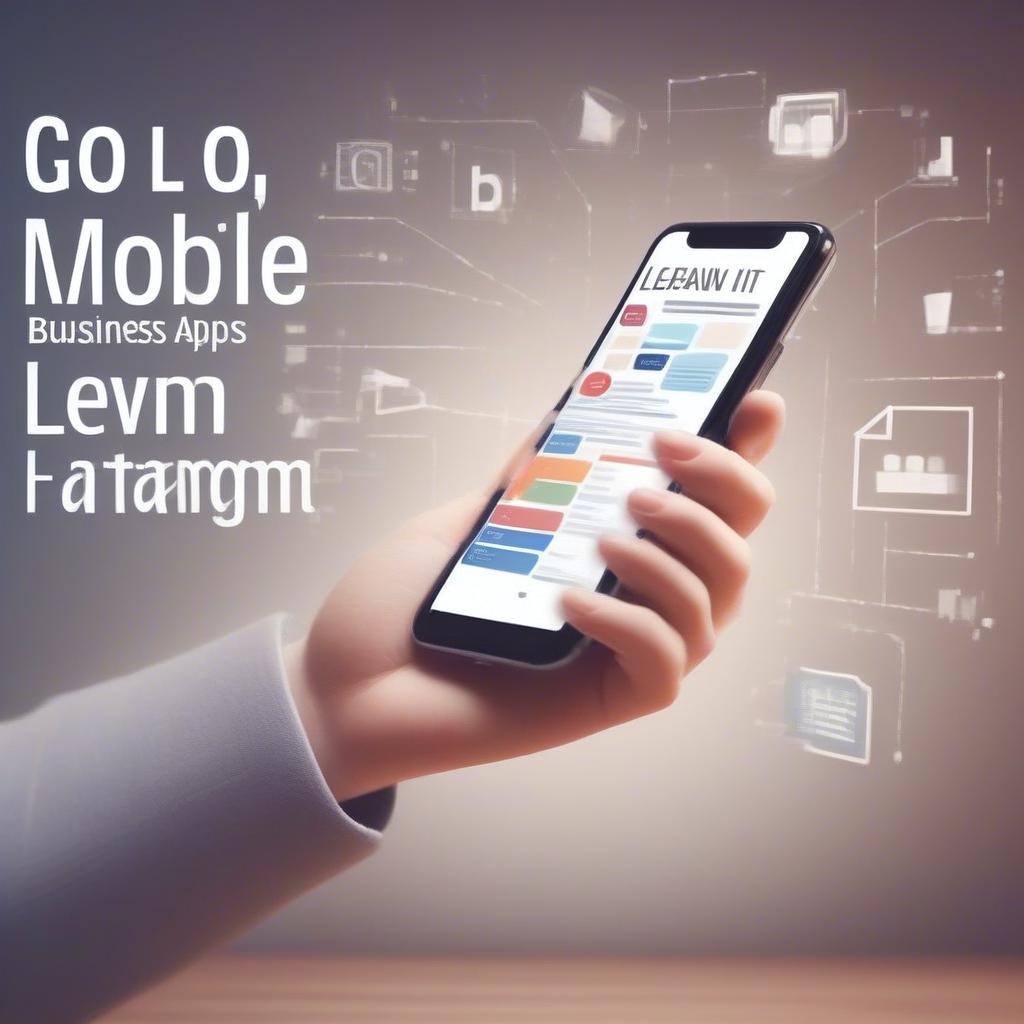
The Role of Mobile Apps in Streamlining Event Management
Mobile apps have revolutionized nearly every aspect of our lives, and event management is no exception. They offer powerful tools to streamline processes, enhance attendee experiences, and ultimately, contribute to the success of any event, large or small. Let’s delve into how mobile apps are transforming the event planning landscape.
Why Mobile Apps are Essential for Modern Event Management
The days of relying solely on paper programs and static websites are gone. Attendees expect immediate information, personalized experiences, and seamless interactions. Mobile apps provide precisely that.
- Enhanced Attendee Engagement: Mobile apps allow event planners to connect with attendees before, during, and after the event, fostering a sense of community and excitement.
- Streamlined Communication: Instant notifications, updates, and announcements keep attendees informed and engaged, minimizing confusion and maximizing participation.
- Improved Data Collection: Mobile apps provide valuable data on attendee behavior, preferences, and feedback, enabling event planners to make data-driven decisions and improve future events.
- Cost Reduction: By replacing printed materials with digital content, mobile apps significantly reduce printing costs and contribute to a more sustainable event.
- Increased Sponsorship Opportunities: Mobile apps offer new avenues for sponsors to connect with attendees through targeted advertising and interactive content.
- Increased ROI: By streamlining operations, improving attendee engagement, and providing valuable data, mobile apps ultimately contribute to a higher return on investment for event organizers.
Core Features of Event Management Mobile Apps
A well-designed event management app goes beyond simply displaying information. It should offer a suite of features designed to enhance the entire event experience.
1. Event Schedule & Personalized Agendas
- Comprehensive Schedule: Display the entire event schedule in a clear, easily navigable format, including session titles, speakers, locations, and times.
- Personalized Agendas: Allow attendees to create personalized agendas by selecting the sessions they want to attend, ensuring they don’t miss out on key events.
- Session Reminders: Send push notifications reminding attendees of upcoming sessions, maximizing attendance and engagement.
- Calendar Integration: Enable attendees to add sessions to their personal calendars with a single tap, simplifying scheduling.
2. Interactive Maps & Navigation
- Venue Maps: Provide detailed maps of the event venue, highlighting key locations such as session rooms, restrooms, food vendors, and exhibitor booths.
- Indoor Navigation: Implement indoor navigation features to guide attendees to their desired locations within the venue, eliminating confusion and improving the overall experience.
- Interactive Wayfinding: Allow attendees to search for specific locations or sessions and receive step-by-step directions.
3. Speaker Profiles & Information
- Detailed Speaker Profiles: Showcase speaker profiles with biographies, photos, contact information, and links to their social media accounts.
- Session Details: Link speaker profiles to their respective sessions, providing attendees with easy access to information about presenters and their topics.
- Q&A Functionality: Integrate Q&A functionality to allow attendees to submit questions to speakers during sessions.
4. Attendee Networking & Communication
- Attendee Directory: Create a searchable directory of all event attendees, allowing them to connect with each other and build valuable relationships.
- In-App Messaging: Enable attendees to communicate with each other through in-app messaging, facilitating networking and collaboration.
- Social Media Integration: Integrate with social media platforms to allow attendees to share their event experiences and connect with the wider community.
- Matchmaking Features: Implement matchmaking features to connect attendees with similar interests or professional backgrounds.
5. Real-time Updates & Notifications
- Push Notifications: Utilize push notifications to send real-time updates, announcements, and reminders to attendees, keeping them informed and engaged.
- Emergency Alerts: Provide a mechanism for sending emergency alerts to attendees in case of unforeseen circumstances.
- Interactive Polling & Surveys: Conduct interactive polls and surveys during sessions to gather feedback and gauge attendee engagement.
6. Gamification & Rewards
- Points System: Implement a points system to reward attendees for participating in various activities, such as attending sessions, visiting exhibitor booths, and networking with other attendees.
- Leaderboards: Display leaderboards to foster friendly competition and encourage engagement.
- Badges & Rewards: Award badges and rewards for completing specific tasks or achieving certain milestones.
7. Sponsor Integration & Promotion
- Sponsor Profiles: Create dedicated sponsor profiles within the app, showcasing their products and services.
- Targeted Advertising: Offer targeted advertising opportunities to sponsors based on attendee interests and preferences.
- Lead Generation: Provide tools for sponsors to collect leads from attendees who visit their booths or interact with their content.
- Interactive Games & Contests: Host interactive games and contests sponsored by exhibitors to attract attendees to their booths.
8. Feedback Collection & Analytics
- Session Feedback Forms: Include session feedback forms within the app to gather attendee feedback on speakers and content.
- Event Surveys: Conduct post-event surveys to gather overall feedback on the event and identify areas for improvement.
- Data Analytics Dashboard: Provide a data analytics dashboard that tracks key metrics such as attendee engagement, session attendance, and sponsor performance.
Choosing the Right Event Management Mobile App
Selecting the right mobile app for your event is crucial for its success. Consider these factors when making your decision:
- Event Size & Complexity: Choose an app that is scalable and can accommodate the size and complexity of your event.
- Budget: Determine your budget for the app and explore options that fit within your financial constraints.
- Required Features: Identify the key features that are essential for your event and ensure the app offers them.
- Customization Options: Look for an app that allows you to customize the design and branding to match your event’s theme.
- User-Friendliness: Choose an app that is easy to use and navigate, both for event organizers and attendees.
- Technical Support: Ensure the app provider offers reliable technical support in case you encounter any issues.
- Integration Capabilities: Consider whether the app needs to integrate with other event management tools you are using.
- Security & Privacy: Ensure the app provider has robust security measures in place to protect attendee data.
- Testimonials & Reviews: Read testimonials and reviews from other event organizers who have used the app.
Implementing a Mobile App: A Step-by-Step Guide
Implementing a mobile app for your event requires careful planning and execution. Here’s a step-by-step guide to help you get started:
- Define Your Objectives: Clearly define your objectives for using a mobile app. What do you want to achieve? (e.g., increase attendee engagement, reduce costs, improve data collection).
- Choose an App Provider: Research and select an app provider that meets your needs and budget.
- Customize the App: Customize the app with your event’s branding, logo, and color scheme.
- Populate the App with Content: Populate the app with all relevant event information, including the schedule, speaker profiles, venue maps, and sponsor details.
- Promote the App: Promote the app to attendees before, during, and after the event.
- Provide Support: Offer support to attendees who have questions or need assistance with the app.
- Collect Feedback: Collect feedback from attendees on their experience using the app.
- Analyze Data: Analyze the data collected through the app to identify areas for improvement.
Examples of Successful Mobile App Implementations in Event Management
- Large Conferences: A global technology conference used a mobile app to manage over 10,000 attendees. The app included features such as personalized agendas, interactive maps, speaker profiles, and in-app networking. The result was a significant increase in attendee engagement and satisfaction.
- Trade Shows: A trade show for the fashion industry used a mobile app to connect buyers and sellers. The app included features such as product catalogs, exhibitor profiles, and appointment scheduling. The result was a more efficient and productive trade show experience.
- Music Festivals: A music festival used a mobile app to provide attendees with information about the schedule, artists, and venue. The app also included features such as a cashless payment system and interactive maps. The result was a smoother and more enjoyable festival experience.
- Corporate Events: A company used a mobile app to manage a corporate retreat for its employees. The app included features such as the schedule, activity sign-ups, and team-building games. The result was a more engaging and collaborative retreat experience.
Tips for Maximizing the Impact of Your Event Management Mobile App
- Start Early: Begin planning your mobile app strategy well in advance of your event.
- Promote Heavily: Promote the app through all available channels, including your website, email marketing, and social media.
- Make it Easy to Download: Provide clear and easy-to-find download links for the app on both the App Store and Google Play.
- Offer Incentives: Offer incentives for attendees to download and use the app, such as exclusive content or discounts.
- Keep it Updated: Regularly update the app with fresh content and new features.
- Monitor Usage: Monitor app usage to identify areas where you can improve the attendee experience.
- Respond to Feedback: Respond to attendee feedback promptly and address any issues they may be experiencing.
- Train Your Staff: Train your event staff on how to use the app and how to assist attendees with any questions they may have.
The Future of Event Management Mobile Apps
The future of event management mobile apps is bright, with new technologies and features constantly emerging.
- Artificial Intelligence (AI): AI-powered chatbots can provide personalized support to attendees, answering their questions and guiding them through the event. AI can also be used to analyze attendee data and provide insights to event organizers.
- Augmented Reality (AR): AR can be used to enhance the event experience by overlaying digital information onto the real world. For example, attendees could use AR to scan a QR code on a speaker’s profile and instantly access their presentation slides.
- Virtual Reality (VR): VR can be used to create immersive event experiences, allowing attendees to attend sessions and network with other attendees from anywhere in the world.
- Blockchain Technology: Blockchain technology can be used to enhance the security and transparency of event ticketing and registration processes.
Leveraging Mobile Apps for a Sustainable Event Planning Business
Mobile apps contribute significantly to sustainable event planning by reducing paper consumption, minimizing waste, and optimizing resource allocation. By offering digital alternatives to printed materials, event organizers can reduce their environmental footprint and promote a more eco-friendly event. Furthermore, data collected through mobile apps can help optimize energy consumption, reduce food waste, and improve transportation planning, contributing to a more sustainable and responsible event planning business.
Learn Business: Your Partner in Event Planning Success
At Learn Business, we understand the challenges and opportunities that come with running a successful event planning business. We are committed to providing you with the resources, guidance, and templates you need to thrive in this competitive industry.
How Learn Business Supports Event Planners:
- Comprehensive Guides: Access detailed guides on all aspects of event planning, from budgeting and marketing to logistics and execution.
- Customizable Templates: Utilize our library of customizable templates for event proposals, contracts, budgets, timelines, and more.
- Expert Advice: Benefit from the insights and expertise of experienced event planners and business professionals.
- Business Tools: Leverage our suite of business tools to streamline your operations and improve your efficiency.
- Community Support: Connect with other event planners in our online community to share ideas, ask questions, and collaborate on projects.
Templates for Event Planning:
- Event Proposal Template: Craft compelling proposals that win new clients.
- Event Budget Template: Manage your finances effectively and ensure profitability.
- Event Timeline Template: Stay on track with a detailed timeline of tasks and deadlines.
- Vendor Contract Template: Protect your business with legally sound vendor contracts.
- Post-Event Survey Template: Gather feedback and improve future events.
Learn Business provides the foundation you need to build a thriving event planning business. Start your journey to success with us today!
Conclusion: Embracing Mobile Apps for Event Management Excellence
Mobile apps are no longer a luxury; they are a necessity for modern event management. By embracing these powerful tools, event planners can streamline operations, enhance attendee experiences, and ultimately, create more successful and memorable events. From personalized agendas and interactive maps to real-time updates and gamification, mobile apps offer a wealth of features that can transform the event planning landscape. By carefully selecting the right app, implementing it effectively, and continuously monitoring its performance, event planners can unlock the full potential of mobile technology and achieve event management excellence.



Leave a Reply